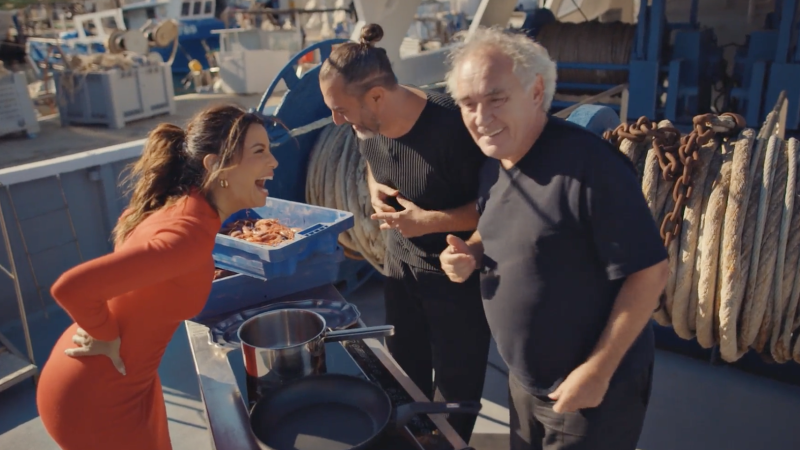CNN
—
Sometimes, the simplest dishes are the most satisfying.
Suquet, a traditional Catalan seafood stew, is that kind of dish.
Its origins are humble — fishermen on the crystal clear waters of Catalonia’s Costa Brava historically prepared it on their boats with the catch of the day, making for a quick and easy meal to fuel a hard day’s work.
Fishermen still make suquet on their boats today. Over the years, as Spanish cuisine underwent a gastronomic revolution, the dish has also come to embody a tension at the heart of Catalonia’s distinct culture: between el seny, the practical, and la rouxa, the innovative.
The acclaimed chef Ferran Adrià transformed the humble suquet into a gourmet experience at El Bulli, the avant-garde Catalan restaurant that was voted the world’s best a record five times and where Adrià served as head chef.

Suquet was the first dish that Adrià learned to cook professionally, infusing traditional ingredients and methods with the creative spirit of modern Catalan gastronomy. The version he served at El Bulli until it closed in 2011 was made with red prawns, potato balls and seawater from the neighboring Cala Montjoi.
But in the first episode of the CNN series “Eva Longoria: Searching For Spain,” Adrià returns to suquet’s roots and prepares the stew on a boat, with his signature elevated twist.
“That particular dish is so simple, but when you’re eating it, you’re like, ‘What’s happening in my mouth?’” Eva Longoria tells CNN. “It’s an explosion of flavors.”
What makes suquet stand out, Longoria adds, is the quality of the ingredients.
Even if you don’t have the saltwater and fresh fish of the Mediterranean Sea at your fingertips, you can still give Adrià’s adaptation a whirl at home. Just use the freshest seafood and produce you can find and maybe get a little creative — in the true Catalan way.
This recipe is courtesy of Ferran Adrià.
Makes 4 servings
For the shrimp, essence and broth
28 shrimp (2.5 ounces each)
Olive oil
For the potatoes
24 small potatoes
For the aioli
3 cloves of garlic
Salt
150 grams olive oil (5.3 ounces)
For the suquet
24 turned potatoes (from previous preparation)
20 grams aioli (0.75 ounces)
150 grams shrimp broth (5.3 ounces)
shrimp essence
4 cloves of garlic
20 grams chopped parsley (0.8 ounces)
1 ripe tomato, around 65 g (2.3 ounces)
5 grams sweet paprika (0.2 ounces)
100 grams saltwater (about 2/5 of a cup)
60 grams butter (about 1/4 cup)
50 grams liquid cream, 35% m.g. (1.8 ounces)
50 grams olive oil (1.8 ounces)
Salt
For finishing
24 sprigs of fresh parsley
Olive oil
Salt
For the shrimp
Separate the heads from the shrimp tails.
Peel the tails and remove the intestines from each tail.
Using a sharp awl, make a 2 cm long incision in the widest part of the tail.
For the shrimp essence
Sauté the shrimp heads in a hot pan with a little oil.
Press the heads one by one to extract all the juice.
Strain the juice through a strainer and store in the refrigerator.
Save the heads to use for the broth.
For the shrimp broth
Put the heads in a saucepan and cover with water.
Bring to a boil and boil for 10 minutes.
Strain and save the broth.
For the potatoes
Peel the potatoes.
With the help of a sharp awl, turn the potatoes until they are as round as possible.
Store covered with water at room temperature.
For the aioli
Place the peeled garlic cloves in a mortar and pestle and pound to a fine puree.
Add a little salt.
Combine with the mortar and pestle and add the oil in a thin stream. (The consistency should be similar to mayonnaise.)
For the suquet
Peel the garlic and cut into 0.2 cm brunoise slices (tiny cubes).
Make two superficial cross-shaped incisions on the bottom of the tomato.
Using a skewer, remove the base of the tomato stem.
Immerse in boiling water for 15 seconds.
Remove with a skewer and cool in water and ice.
Peel, quarter and remove the seeds.
Cut the tomato into 0.3 cm brunoise slices.
Whip the cream.
Sauté the potatoes in a hot frying pan with olive oil for 15 minutes. Do not let them brown.
Add the chopped garlic, brown lightly and add the tomato and parsley.
Brown for 1 minute and add the paprika.
Moisten the potatoes with the sea water and the shrimp broth.
Bring to a boil, and when the potatoes are cooked, remove from heat.
Add the butter, 30 grams (a quarter cup) of whipped cream, the shrimp essence and the aioli.
To serve
In a hot frying pan with a little oil, cook the shrimp with salt.
Place 7 suquet potatoes and 7 shrimp each in four bowls.
Ladle the suquet broth into each bowl and grill lightly over a grill pan.
Finish each dish with 6 sprigs of fresh parsley.
























